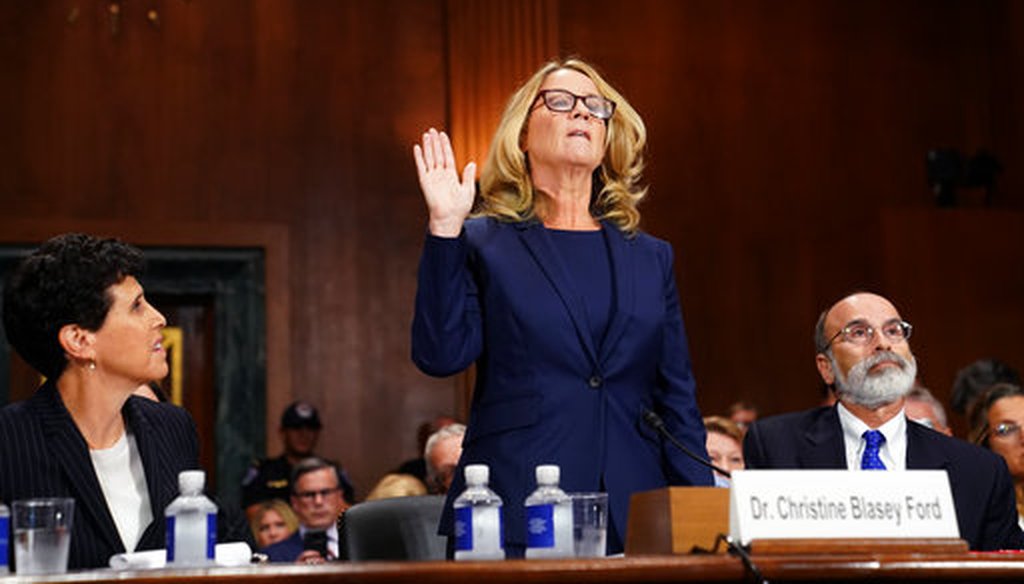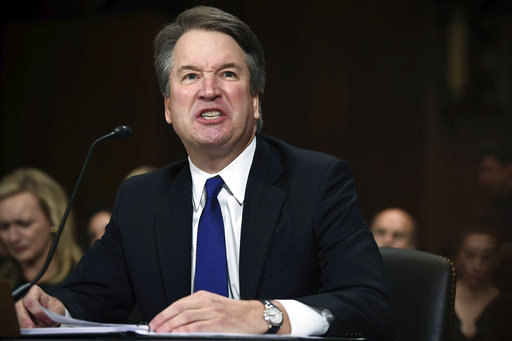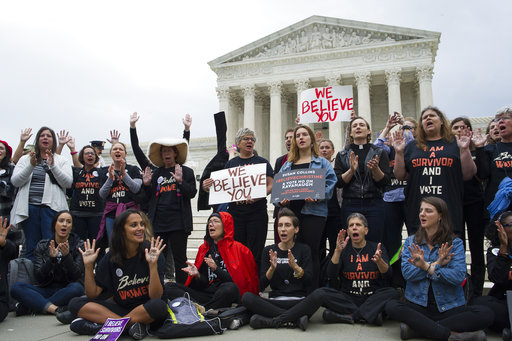Stand up for the facts!
Our only agenda is to publish the truth so you can be an informed participant in democracy.
We need your help.
I would like to contribute

Christine Blasey Ford is sworn in to testify before the Senate Judiciary Committee on Capitol Hill in Washington, Thursday, Sept. 27, 2018. Her attorney's Debra Katz and Michael Bromwich watch. (AP Photo/Andrew Harnik, Pool)
PolitiFact is following the confirmation hearings of Supreme Court nominee Brett Kavanaugh and answering your questions. If you have a question you want our team of researchers to look into, email us at truthometer@politifact.com. (You can click on the links below to go directly to the answer.)
What were the top takeaways from Ford’s testimony?
What were the top takeaways from Kavanaugh’s testimony?
Was Kavanaugh of legal drinking age?
Why was a prosecutor asking questions Thursday instead of Republican senators?
Sign up for PolitiFact texts
What was the prosecutor’s line of questioning?
Who is Mark Judge? Why didn’t he testify?
What might senators learn from an FBI investigation?
Did two other women who accused Kavanaugh of misconduct refuse to testify?
Do most sexual assaults go unreported?
Did the New York Times refuse to report on one of the sexual assault accusations?
This story was last updated on Sept. 28 at noon ET.
The substance of Christine Blasey Ford’s allegations about a sexual assault 36 years ago were well known prior to the hearing. But Ford’s live testimony Sept. 27, her voice quavering as she appeared to hold back tears, added a new layer to the story of sexual assault she allegedly suffered at the hands of President Donald Trump’s Supreme Court nominee.
Ford acknowledged some specifics have been lost to time. But she said her experience as a 15-year-old rising high school sophomore left a mark.
"The details about that night that bring me here today are ones I will never forget," she said. "They have been seared into my memory and have haunted me episodically as an adult."
Asked about her strongest memory of the incident, Ford recalled Kavanaugh and his friend Mark Judge, a witness to the alleged assault, laughing after the 17 year-old Kavanaugh is said to have muffled Ford’s screams for help as he groped her and fumbled to forcibly remove her clothes.
"Indelible in the hippocampus is the laughter," Ford said, referring to the brain region responsible for memory, "the uproarious laughter between the two."
In the run-up to the hearing, some people raised the possibility that Ford had been mistaken about the identity of her assailant. Asked what degree of certainty she had that it was in fact Brett Kavanaugh who assaulted her, Ford replied that she had no doubt.
"100 percent," she said.
In a tone that was at turns fiery, emotional and defiant, Kavanaugh denied the allegations and pointed to statements from three others named by Ford who denied attending the party or witnessing the assault.
"I was not at the party described by Dr. Ford," Kavanaugh said, adding that he has never been alone in a room with his friend Mark Judge and Ford, as she described.
To bolster his alibi, Kavanaugh cited calendars from the summer of 1982, which contain notes of Kavanaugh’s schedule and personal affairs, and which he claims would have contained an entry that corresponds to the alleged gathering.
Kavanaugh also denied claims brought forth recently by his Yale classmate, Deborah Ramirez, and a third accuser, Julie Swetnick.
"This whole, two-week effort has been a calculated and orchestrated political hit, fueled with apparent pent-up anger about President Trump and the 2016 election," he said, adding the plot was also motivated in part by "revenge on behalf of the Clintons."
Kavanaugh declined calls from several Democratic lawmakers to request an FBI investigation be opened to more thoroughly examine the charges leveled against him.
Kavanaugh’s love of beer was clear during his testimony in the Senate Judiciary Committee hearing Sept. 27.
"I drank beer with my friends," Kavanaugh said. "Almost everyone did. Sometimes I had too many beers. Sometimes others did. I liked beer. I still like beer. But I did not drink beer to the point of blacking out, and I never sexually assaulted anyone."
Kavanaugh also clarified that drinking was legal for seniors at the time.
"The drinking age was 18 in Maryland for most of my time in high school, and was 18 in D.C. for all of my time in high school," Kavanaugh said. "The drinking age, as I noted, was 18, so the seniors were legal, senior year in high school, people were legal to drink."
For Kavanaugh, in Maryland, that would not have been true his senior year. And it would certainly not be true for him in the summer of 1982, before Kavanaugh’s senior year and the period when Ford says she was assaulted.
The drinking age in Maryland changed from 18 to 21 on July 1, 1982, according to the National Highway Traffic Safety Administration. So Kavanaugh who was — born Feb. 12, 1965 — would not have legally been allowed to drink in Maryland until February 1986.
In Washington, D.C, where the drinking age was 18, Kavanaugh would have legally been able to drink starting February 1983.
The Senate Judiciary Committee includes four women — all of whom are Democrats. Republicans, by contrast, currently have no female members on the committee. Rather than question Ford themselves, the all-male Republican majority hired Arizona prosecutor Rachel Mitchell, who has extensive experience handling sex-crimes prosecutions.
Sen. Chuck Grassley, R-Iowa, who chairs the committee, said the move was made to avoid a repeat of the highly politicized 1991 confirmation hearing of Supreme Court nominee Clarence Thomas. During that hearing, Republican senators asked pointed questions of law professor Anita Hill, who had accused Thomas of sexual harassment.
For her part, Ford requested that senators conduct the questioning themselves.
Phoenix prosecutor Rachel Mitchell asks questions to Christine Blasey Ford before the Senate Judiciary Committee hearing Sept. 27, 2018, in Washington. (AP)
In five-minute segments on behalf of each Republican member, Mitchell questioned Ford on an array of details, some from the day of the alleged assault and others from the period this summer before and after she decided to go public with her accusations.
• Ford acknowledged that she didn’t remember how she got home, except to say she didn’t drive. Mitchell showed her a map that indicated an 8-mile distance between the approximate location of the alleged assault and her own home. Ford said she estimated the date of the party by when she secured her driver’s license around age 16.
• Under questioning, Ford acknowledged that she had flown to Washington, D.C., for testimony, despite having earlier cited anxiety about flying as a reason for delaying her testimony by a few days. She also said she had flown to Hawaii and the South Pacific on vacations.
• Mitchell probed the timeline of Ford’s decision to go public, including her interactions with two Democratic lawmakers, Rep. Anna Eshoo, her local California congresswoman, and Sen. Dianne Feinstein, the committee’s ranking member.
• Mitchell asked about the polygraph test that Ford took, including who had suggested the polygrapher and who had paid for it. (Her lawyers interjected that they had paid for it.) Ford also said she had taken the polygraph within a day of having attended her grandmother’s funeral.
When it came time to question Kavanaugh, Mitchell initally used Republicans’ time. Eventually, GOP senators began taking back their time.
"You’ve got nothing to apologize for," said Sen. Lindsey Graham, R-S.C., to Kavanaugh. "This is the most unethical sham since I’ve been in politics, and if you really wanted to know the truth, you sure as hell wouldn’t have done what you’ve done to this guy."
Graham added, "This is not a job interview. This is hell."
Democrats pursued a series of questions concerning Kavanaugh’s use of alcohol. They asked whether he ever drank so excessively that he lost consciousness, and about the extent to which Kavanaugh is the embodiment of "Bart O'Kavanaugh," a character described in a book by Mark Judge chronicling his own struggles with alcohol.
"I've gone to sleep," Kavanaugh said, "but I've never blacked out."
The most conspicuous absence was Mark Judge, Kavanaugh’s longtime friend who was alleged to be present in two of the three situations Kavanaugh’s accusers reported.
Ford said in her testimony Judge had been in the room and laughing with Kavanaugh as Kavanaugh lay on top of her and tried to remove her clothing.
In a letter to Grassley and Feinstein, Judge said he had no memory of the "alleged incident" and that he did not "wish to speak publicly regarding the incidents described in Dr. Ford’s letter."
A Washington Post reporter found Judge in the house of a longtime friend in Bethany Beach, Del., nearly three hours away, on Sept. 24. Judge did not provide comment. His lawyer, Barbara "Biz" VanGelder, said she told Judge to leave Washington because "he is a recovering alcoholic and is under unbelievable stress."
When Ford’s lawyers complained the committee has refused to subpoena Judge, Grassley’s chief counsel for judicial nominations, Mike Davis, said their concerns went against standard committee procedure.
"The committee determines which witnesses to call, how many witnesses to call, in what order to call them and who will question them," Davis wrote. "These are nonnegotiable."
Supreme Court nominee Judge Brett Kavanaugh gives his opening statement before the Senate Judiciary Committee, Thursday, Sept. 27, 2018 on Capitol Hill in Washington. (AP)
Democrats have pushed for an FBI investigation, and Republicans have pushed back. Sen. Chuck Grassley, R-Iowa, underscored the limits of what the FBI might provide in his opening statement.
"Contrary to what the public has been led to believe, the FBI doesn't perform any credibility assessments or verify the truth of any events in these background investigations," Grassley said. "It's up to the Senate to assess their credibility."
That’s true, but former prosecutors such as George Fisher at Stanford University School of Law told us the FBI could uncover details that would confirm or undercut differing accounts.
"Any investigator would begin with Mark Judge," Fisher said. "If the question is one of possible misidentification –– either of Judge Kavanaugh or of Mark Judge –– the local Safeway's records may reveal whether Mark Judge worked there sometime in the early 1980s, as Dr. Blasey Ford says."
A full investigation could produce several lines of evidence, Fisher said.
The FBI would only be limited by the marching orders it gets from the White House and the Judiciary Committee. But in theory, even if it didn’t deliver conclusions, it could provide many bits of information that could help senators decide who to believe.
Women supporters of Christine Blasey Ford demonstrate in front of the Supreme Court in Washington Sept. 27, 2018. (AP)
Grassley said two women who came forward with their own accusations against Kavanaugh refused to provide evidence or testimony despite the committee’s efforts.
Deborah Ramirez accused Kavalaugh of assault at a Yale University party in a New Yorker report. Three days later, Julie Swetnick accused Kavanaugh of engaging in sexual misconduct in various parties in the 1980s and said she was raped at one of these parties.
Grassley said his staff has attempted to secure evidence from Ramirez and Swetnick, eight and six times respectively, and "neither attorney has made their clients available for interview."
Grassley’s office provided us their correspondence with Michael Avenatti, Swetnick’s lawyer. The emails show the two talking past each other. Davis, the committee’s chief counsel, asked whether and when Swetnick would agree to an interview with committee investigators three times. Avenatti did not respond to the specific requests.
He instead laid out various demands, including "sworn testimony before the committee."
"(Swetnick) is prepared to be questioned as to her allegations for as long as it takes to get to the truth. Please confirm that she will be allowed to testify and contact me so that we may agree to the logistics," Avenatti wrote in an email sent at 6 a.m. on Sept. 27. Grassley’s office did not say whether they had responded at the time of publication.
In a letter to Grassley and Feinstein dated Sept. 26, William Pittard, Ramirez’s lawyer, said Ramirez, through counsel, "repeatedly has asked the committee to speak with her about a process by which she can fairly can be heard by Committee members. But the majority staff thus far has refused even to speak with Ms. Ramirez’s counsel; instead, the staff has insisted that Ms. Ramirez first ‘provide her evidence.’ "
Grassley’s office said they requested testimony from Ramirez twice.
As the hearing started, Feinstein, the only Judiciary Committee member who knew about Ford’s allegations, said 60 percent of sexual assaults go unreported. That figure matches statistics from the Rape Abuse and Incest National Network, which found that out of 1,000 rapes, 310 are reported to police. That is a five-year average.
The latest summary from the U. S. Bureau of Justice Statistics said that 23 percent of rapes or sexual assaults were reported to police. The analysis also showed that the rate of unreported crime for rape or sexual assault was three times higher than the rate of reported crime.
Sen. John Cornyn, R-Texas, called the allegation of sexual assault by Ramirez one "not even the New York Times would report."
The New Yorker broke Ramirez’s story Sept. 23. When the New York Times addressed the accusation in another story, they wrote, "The New York Times had interviewed several dozen people over the past week in an attempt to corroborate Ms. Ramirez’s story, and could find no one with firsthand knowledge." They were unable to interview Ramirez.
In a statement to the Washington Post, New York Times executive editor Dean Baquet clarified that his paper wasn't "questioning" their story: "We’ve been competing against Ronan Farrow for a year and he’s terrific."
The New York Times did report on the allegation on Sept. 25. There, they again clarified that the New York Times was referring to the fact that neither the New Yorker nor the New York Times were able to find witnesses to the episode.
Our Sources
Senate Judiciary Committee, Prepared Written Testimony of Judge Brett M. Kavanaugh, Sept. 26, 2018
Senate Judiciary Committee, Written testimony of Dr. Christine Blasey Ford, Sept. 26, 2018
New Yorker, "A Sexual-Misconduct Allegation Against the Supreme Court Nominee Brett Kavanaugh Stirs Tension Among Democrats in Congress," Sept. 14, 2018
U.S. Bureau of Justice Statistics, Criminal victimization - 2016, December 2017
CNN, "Senate Judiciary hires female outside counsel to question Kavanaugh accuser on Thursday," Sept. 26, 2018
Washington Post, ‘How'd you find me?': Mark Judge has been holed up in a beach house amid media firestorm, Sept. 26, 2018
New York Times, Christine Blasey Ford Reaches Deal to Testify at Kavanaugh Hearing, Sept. 23, 2018
Axios, Letter.Counsel for Mark Judge, Sept. 18, 2018
Michael Avenatti, Tweet, Sept. 27, 2018
Michael Avenatti, Tweet, Sept. 26, 2018
Scribd, Deborah Ramirez letter to Senate Judiciary Committee, Sept. 26, 2018
The New Yorker, Senate Democrats Investigate a New Allegation of Sexual Misconduct, from Brett Kavanaugh’s College Years, Sept. 23, 2018
PolitiFact, "Fact-checking Donald Trump’s press conference on eve of Kavanaugh, Ford hearings," Sept. 26, 2018
Tweet from NBC News, Sept. 27, 2018
Tweet from BBC News, Sept. 27, 2018
Email interview, George Fisher, professor of law, Stanford University School of Law, Sept. 27, 2018
Email interview, Michael Zona, Grassley communications director, Sept. 27, 2018
CQ, Senate Judiciary Committee Holds Hearing on Nomination of Brett Kavanaugh to be Associate Justice to Supreme Court, Afternoon Session, Day Five, Sept. 27, 2018
Chicago Journals, Raising the Alcohol Purchase Age: Its Effects on Fatal Motor Vehicle Crashes in Twenty-Six States, Dec. 2, 2014
Washington Post, D.C. Raises Drinking Age to 21, Sept. 24, 1986
National Highway Traffic Safety Administration, State MLDA and zero tolerance law history, accessed Sept. 28, 2018








 PolitiFact Rating:
PolitiFact Rating: 


















































